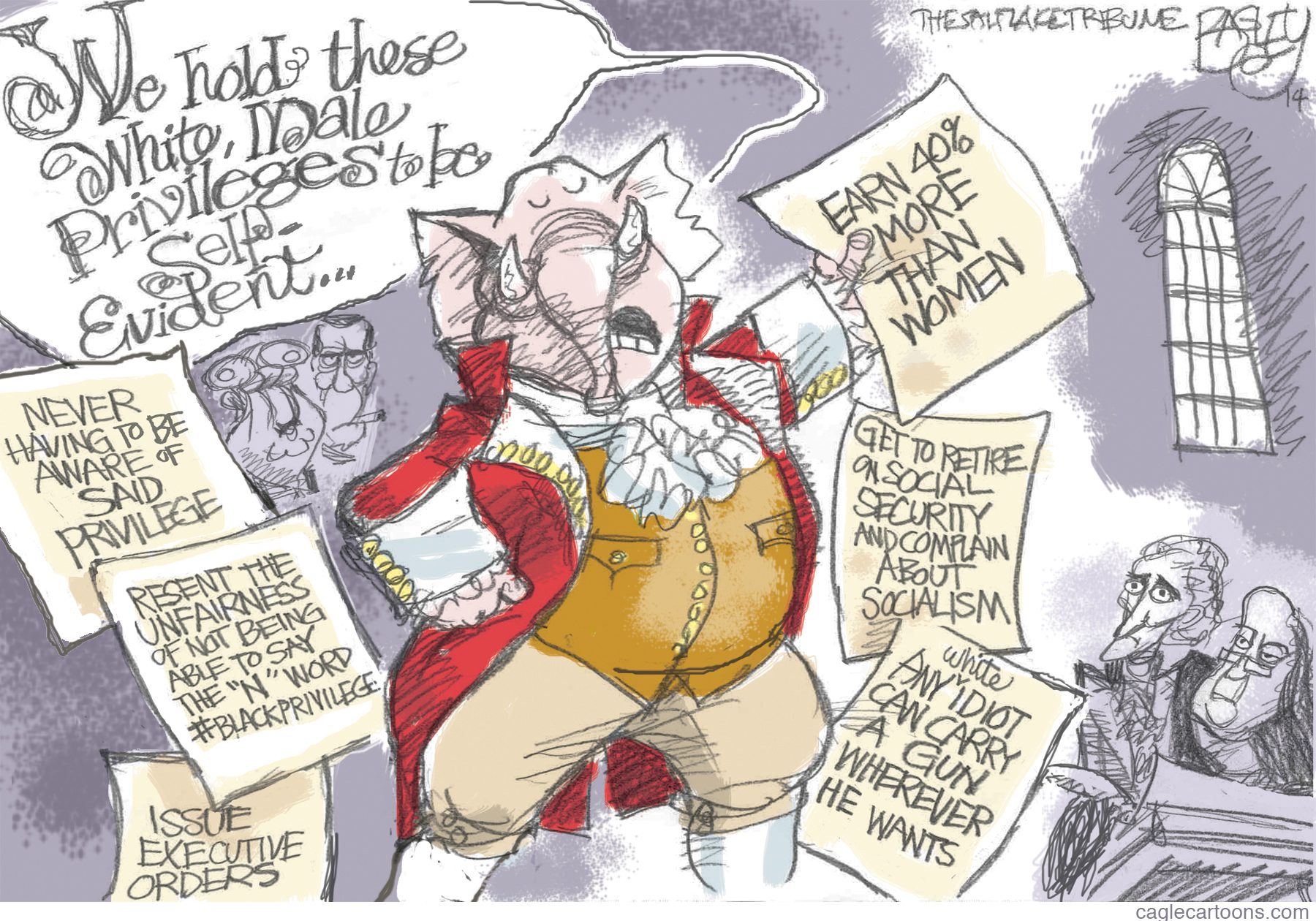BY BOB DARCY
 Popular conservative columnists such as Steve Fair and Pat Buchanan reverentially refer to the Founding Fathers, their Declaration of Independence, Constitution and Bill of Rights, to support their opinions.
Popular conservative columnists such as Steve Fair and Pat Buchanan reverentially refer to the Founding Fathers, their Declaration of Independence, Constitution and Bill of Rights, to support their opinions.
Recall the words?
“We hold these truths to be self-evident, that all men are created equal, that they are endowed by their Creator with certain unalienable Rights, that among these are Life, Liberty and the pursuit of Happiness.”
“We the People of the United States, in Order to form a more perfect Union, establish Justice, insure domestic Tranquility, provide for the common defence, promote the general Welfare, and secure the Blessings of Liberty to ourselves and our Posterity, do ordain and establish this Constitution for the United States of America.”
“Congress shall make no law respecting an establishment of religion, or prohibiting the free exercise thereof, or abridging the freedom of speech, or of the press, or the right of people peaceably top assemble, and to petition the Government for redress of grievances.”
“The powers not delegated to the United States by the Constitution, nor prohibited by it to the States, are reserved to the States respectively, or to the people.”
Conservative columnists bemoan our present ways, calling us to return to what the Founders intended, what our soldiers from the Revolution on sacrificed for, in those thrilling days of yesteryear.
Our Founders – all of them from colonies where slaveholding was legal at the time of the Declaration of Independence, most of them from the eight slave states at the time of the Constitution, many slave owners themselves, with certain exceptions – had little trouble reconciling slavery with their words in the Declaration of Independence, the Constitution or the Bill of Rights.
Historian James Oliver Horton noted, “In the 72 years between the election of George Washington and the election of Abraham Lincoln, 50 of those years [had] a slaveholder as president of the United States.” Of the first 12 presidents, only John and John Quincy Adams never owned slaves.
John Adams wrote, “I have, through my whole life, held the practice of slavery in such abhorrence, that I have never owned a negro or any other slave, though I have lived for many years in times, when the practice was not disgraceful, when the best men in my vicinity thought it not inconsistent with their character, and when it has cost me thousands of dollars for the labor and subsistence of free men, which I might have saved by the purchase of negroes at times when they were very cheap.”
Adams’ words show it possible, then, as we do now, to see the clear conflict between the words of the Declaration of Independence, the Constitution and the Bill of Rights and the protection for slaveholders our Founding Fathers constitutionally embedded.
It was not just slavery at which our Founders fell short. There were states’ rights. Their Constitution made clear the limited nature of the federal government and state’s almost unlimited sovereignty. Their Bill of Rights did not recognize fundamental rights of persons.
Rather, it was a limitation on the federal government. States were free to, and did, establish religion, coerce confessions, restrict the press, limit gun ownership, utilize cruel and unusual punishments and protect the rights of slaveholders.
In the end, the Founding Fathers gave us a Constitution that failed to accomplish the one thing a constitution must: provide a means to peaceably settle differences. The result was the Civil War.
The victorious Northern Republicans re-shaped the Constitution with the 13th, 14th and 15th amendments. Slavery ended. They increased federal authority and decreased state sovereignty. Congress was empowered to legislate protection of individual rights, including voting, against state abuse.
The Founders’ Constitution has changed in other important ways, usually without altering the actual wording. The Founders abhorred ‘factions’ and could not conceive political parties. Today we find it impossible to govern without them.
The Constitution says nothing about a federal judge nullifying a law because the judge thinks it unconstitutional. There is no way the Founders could have imagined the growth in presidential power. They envisioned a jealous Congress checking and balancing the presidency. Certainly not Congress itself creating the presidential juggernaut we have today.
Today we have states whining because the federal courts will not let them do what they can to make life horrible for those with non-Biblical sexual orientations, declare any method of execution a legislature comes up with not cruel or unusual, restrict voting rights, deny benefits of citizenship to those born here of “foreigners,” limit the ability of non-English speakers to navigate bureaucracy, bedeck public buildings and property with reminders ours is a Protestant nation, to mention a few pending measures. All that stands in their way is the 14th Amendment.
Those thrilling days of yesteryear, c’mon man!
– Bob Darcy is a retired Oklahoma State University political science professor







